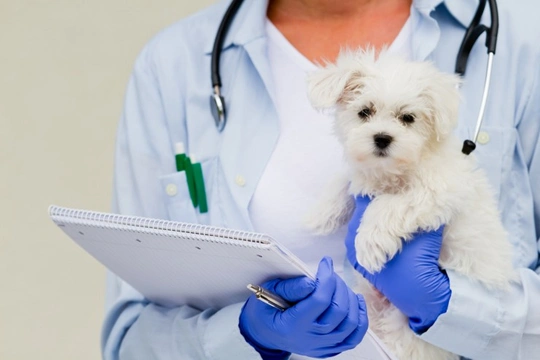
When should I take my puppy for their first vet checkup?
As a new puppy owner, you’re bound to have lots of questions, including when should I take my puppy to the vet for their first check-up? The answer is as soon as possible. Read on to find out more about your puppy’s first visit to the vet.
Why should you take your new puppy to the vet for a check-up?
It's always a good idea to get a new puppy checked out by a vet as soon as you have bought or adopted them. It is recommended that you do this as part of the buying/adoption process and agree with the seller that you can take the puppy back within a set time (around 48 hours) if you are not happy after the vet check. Not only will the vet check be of benefit to your puppy, but it will also give you peace of mind that your puppy is happy and healthy.
What will happen at your puppy’s first visit to the vet?
The vet will give your puppy a thorough examination to make sure they are in good condition. This will include checking for signs of fleas and worms. Your puppy will also be weighed.
If your puppy hasn’t already had their first vaccinations to protect them from infectious diseases, these will also be done during their first visit to the vet. Puppies have their first vaccinations when they are eight to 10 weeks old, and a second round of injections two weeks later - when they are 10 to 12 weeks old.
A positive experience for your puppy
Try to make sure that your puppy’s first visit to the vet is as positive as possible. This is because they will need to get used to going to the vet at regular intervals to be vaccinated, have health checks or for treatment if they become sick or are injured.
Why do puppies need to be vaccinated?
Without vaccinations, dogs can catch diseases that can make them seriously ill, or in some cases, die. In the UK there are four main diseases that dogs are vaccinated against - starting when puppies are eight to 10 weeks old. The diseases that the vaccinations will protect your dog from are Parvovirus, Canine Distemper, Leptospirosis (Lepto) and Infectious Canine Hepatitis.
If a puppy has not been vaccinated and come into contact with the virus, they can get sick very quickly. Even when treated, there is no guarantee they will survive. For this reason, vaccination is the best form of prevention.
Establishing a worming regime
It's really important to get into a worming regime with your new puppy. The best person to advise you is the vet. If your puppy has a large belly when you first get them, this may be a sign that they already have worms, which they would have picked up from their mothers. During your puppy’s first visit, the vet will prescribe a worming treatment.
Getting advice from your vet
Although vets are not trained as canine behaviourists, they will still be able to advise you on how to socialise your puppy. This is important to do in the early months, as it will have a long term impact on their behaviour and confidence and prevent your dog from growing up to be neurotic and fearful.
It's a well-known fact that puppies are at their most inquisitive and receptive to new experiences in the early months, which is why it's so important to gently introduce them to all the things and people they are going to typically meet during their lives. A well-socialised puppy grows up to be a well-balanced, happy and confident character and one that's a pleasure to have and be around.



